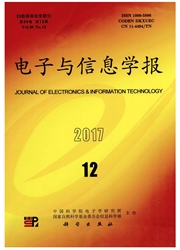

 中文摘要:
中文摘要:
针对认知网络中主用户状态的不确定性和随机检测策略无法保证认知用户准确地寻找可用信道的问题,该文提出一种利用认知无线网络中空闲认知用户进行联合随机检测的策略。在加入空闲认知用户进行检测后,利用马尔科夫模型对认知基站获得的可用信道数进行描述,推导出此时认知网络的检测性能。理论分析和仿真结果表明,利用空闲认知用户可以减少服务时延,提高认知网络的吞吐量。在考虑认知用户汇报检测信息所占用的时长后,通过优化算法得出最优的参与联合检测的空闲认知用户数。
 英文摘要:
英文摘要:
A joint random sensing policy is proposed by using the inactive secondary users in the cognitive network, which is different from previous cognitive radio sensing researches. The policy is proposed due to the uncertainty of primary users’ states and the problem of inability for the random sensing policy to find out vacant channels rapidly. After utilizing inactive secondary users to detect, sensing performance of cognitive networks can be deduced by modeling the list of available channels stored in cognitive base station as Markov model. Both the theoretical analysis and simulating results show that sensing with inactive cognitive users can reduce the service overhead and improve the cognitive network throughput. After considering the report overhead of secondary users, the optimal number of inactive users is obtained which yields the highest throughput of cognitive network through an optimization algorithm.
 同期刊论文项目
同期刊论文项目
 同项目期刊论文
同项目期刊论文
 Exploiting transmission opportunities in heterogeneous wireless networks: a transmission power savin
Exploiting transmission opportunities in heterogeneous wireless networks: a transmission power savin Performance analysis of quantization-based approximation algorithms for precomputing the supported Q
Performance analysis of quantization-based approximation algorithms for precomputing the supported Q 期刊信息
期刊信息
